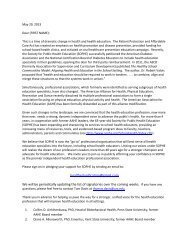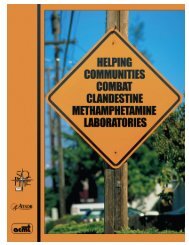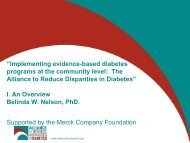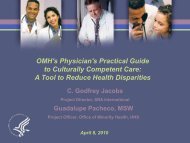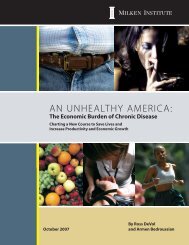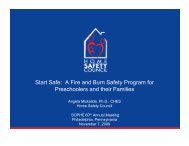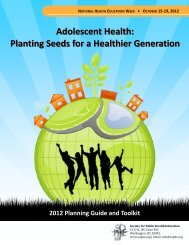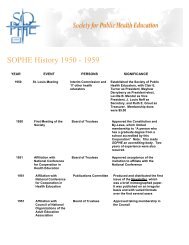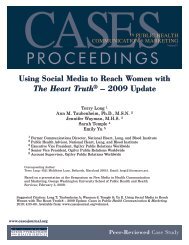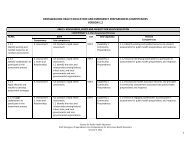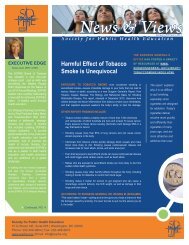healthy people 2020 - Society for Public Health Education
healthy people 2020 - Society for Public Health Education
healthy people 2020 - Society for Public Health Education
You also want an ePaper? Increase the reach of your titles
YUMPU automatically turns print PDFs into web optimized ePapers that Google loves.
✯ Conference Abstracts ✯<br />
friday | november 5<br />
ing Farmers Markets- Working with farmers, develop farmers markets<br />
in communities that lack grocery stores and access to produce to enable<br />
individuals to purchase regionally grown produce directly from farmers<br />
at community farmers markets and stands.<br />
evaluation measures and results: We are currently in the development<br />
phase of the online resource that by summer 2010 will be part of:<br />
http://www.fruitsandveggiesmatter.gov/. Our goal is that consumption<br />
of produce will be increased by a ½ cup daily among communities that<br />
implement one or more of the strategies.<br />
Exploring the Trends and Challenges of New Cancer <strong>Health</strong><br />
Promotion Strategies to Reduce Social Inequities in <strong>Health</strong><br />
Among Culturally and Linguistically Diverse Populations.<br />
Carolina Casares, MD, MPH, American Cancer <strong>Society</strong><br />
Eliminating disparities in cancer screening, diagnosis, treatment, and<br />
mortality is an essential step toward achieving health equity, increasing<br />
access and improving health outcomes <strong>for</strong> patients with cancer. The<br />
American Cancer <strong>Society</strong> (ACS) is dedicated to eliminating cancer by<br />
actively promoting best practices in health promotion, initiating alliances<br />
and partnerships <strong>for</strong> promoting sound policies and synergistic<br />
practices related to chronic disease, and exploring trends and challenges<br />
in implementing media, culturally and linguistically appropriate <strong>for</strong><br />
diverse populations. Much of the suffering and death from cancer could<br />
be prevented by creating opportunities <strong>for</strong> organizations to effectively<br />
communicate health in<strong>for</strong>mation and resources. The ACS wants to<br />
develop population focused and competent tools as a resource <strong>for</strong> reaching<br />
out to minorities, migrants, vulnerable and disadvantage groups<br />
and providing them with health relevant services, while paying close<br />
attention to quality. These tools must be applicable in both trans-border<br />
and trans-national locations. However, there are significant challenges in<br />
developing these tools because of inequalities in access to care, language<br />
barriers, cultural differences, and racial discrimination. One promising<br />
tool is the internet. Internet use among typically very low use Latino<br />
adults has been increasing steadily in the last few years. The ACS is in<br />
the process of piloting a culturally and linguistically adapted web portal<br />
in Spanish <strong>for</strong> the Latino community, that will help promote community<br />
cancer awareness, increase the trust and credibility of the <strong>Society</strong> among<br />
this group and motivate them to use available resources and become<br />
involved by volunteering and supporting the organization. During the<br />
session we will explore several questions regarding the heterogeneity of<br />
Latinos, such as - How can we become relevant to all groups and what<br />
kind of plan, or coordinated ef<strong>for</strong>t, would work <strong>for</strong> them?<br />
Improving the Cultural Competence of Cardiovascular, Cancer,<br />
and Pulmonary Disease Prevention and Early Detection Practices<br />
of <strong>Public</strong> <strong>Health</strong>, Mental/Behavioral <strong>Health</strong> and <strong>Health</strong><br />
Care Providers through Online Training.<br />
Kathy Zavela Tyson, MPH, PhD, CHES, Director of Research Development,<br />
Professor Emeriti, Center <strong>for</strong> Research Strategies, University of Northern Colorado;<br />
Michael Bloom, MPA, CEO, North Colorado <strong>Health</strong> Alliance; Ramon<br />
Del Castillo, PhD, MPA, MSc, Metropolitan State College of Denver; Traci<br />
Mordell, BA, North Range Behvaioral <strong>Health</strong> – Latino Professional Development<br />
Program; Veronica Rivera, MS, CACIII, EMDRII, School of <strong>Education</strong><br />
Colorado State University; Steve Del Castillo, PhD; Chris Del Castillo<br />
In Colorado, Latino/a adults have the highest rates of colorectal cancer<br />
and diabetes and risk <strong>for</strong> cardiovascular and pulmonary disease than any<br />
other ethnic/cultural group due to lifestyle risk factors. To reduce these<br />
health disparities, the North Colorado <strong>Health</strong> Alliance (NCHA) received<br />
funding from the Colorado Department of <strong>Public</strong> <strong>Health</strong> and Environment<br />
Office of <strong>Health</strong> Disparities to improve prevention and early detection<br />
of cancer, cardiovascular or pulmonary disease (CCPD) and patient<br />
compliance among this disparate population. NCHA contracted with<br />
North Range Behavioral <strong>Health</strong> to develop and pilot an on-line Cultural<br />
Competency <strong>Education</strong> Training curriculum. The curriculum, designed<br />
by North Range Behavioral <strong>Health</strong> professionals and consultants from<br />
Compasión Counseling and Training was based on cultural competency<br />
standards. The curriculum, focused on developing four skills or “Four<br />
Habits” to increase patient or client attendance <strong>for</strong> their visits, follow-up<br />
and medical or behavioral health compliance. The Four Habits include:<br />
(1) listening skills, (2) engaging patients/clients in sharing in<strong>for</strong>mation<br />
about health issues, (3) involving patients/clients in developing treatment<br />
and (4) follow-up plans. The curriculum was piloted by providers<br />
and staff in behavioral health, health care and public health agencies in<br />
northern Colorado. The Center <strong>for</strong> Research Strategies, the project evaluator,<br />
developed an electronic Provider and Staff Survey to determine<br />
the impact of the curriculum on behavioral health and medical practices.<br />
The electronic link to the 25 question survey was distributed via email to<br />
70 providers and staff who had initially enrolled in the online curriculum.<br />
A 54% response rate was obtained. Almost two-thirds of survey<br />
respondents (63%) indicated that they were part of integrated behavioral<br />
health or health care services and the majority (71%) worked with or<br />
within an integrated health care service program or team. Among the 19<br />
who had completed the NCHA Cultural Competency Training online,<br />
almost all (95%) utilized listening skills with their patients or clients and<br />
more than half (53%) engaged patients or clients in sharing in<strong>for</strong>mation<br />
about their health issues. To a lesser extent, they involved their patients<br />
or clients in developing treatment plans (37%) or follow-up plans (37%).<br />
The “Four Habits” described in the online training program can enhance<br />
provider skills that may ultimately impact patients’ behavioral health<br />
compliance. The inclusion of cultural competency training <strong>for</strong> behavioral<br />
health, health care and public health professionals who work with<br />
Latino/a populations is essential <strong>for</strong> improving practices and reducing<br />
health disparities.<br />
Identifying Demographic and Situational Factors that<br />
Influence the Use of an Electric Hematological Cancer Toolkit:<br />
A Multivariate analysis.<br />
Bruce Dotterrer, MS, University of Alaska, Institute <strong>for</strong> Circumpolar <strong>Health</strong><br />
Studies (UAA); David Driscoll, PhD, MPH, Gabriel Garcia<br />
The purpose of this study is to identify the demographic and situational<br />
factors that influenced Toolkit users to make contact with national cancer<br />
organizations. Results from an online survey completed by users of the<br />
Toolkit (n=387) were evaluated to assess the influence of these factors. The<br />
mean age of survey participants was 52 years (SD = 15.5), 48% were college<br />
graduates, 56% were female, and 79% were white. A logistic regression<br />
was conducted to assess Toolkit usage. Logistic regression results indicate<br />
that women (OR = 2.8), and those involved with current cancer treatment<br />
(OR = 2.4) were significantly more likely to access and review web-based<br />
materials by national cancer organizations after using the Toolkit. These<br />
results suggest that the user’s stage of treatment must be considered when<br />
developing electronic site-specific cancer in<strong>for</strong>mational media.<br />
plenary session ii<br />
fri / nov 5 / 4:30 am – 6:00 am / Room: Colorado E-F<br />
<strong>Health</strong>y People <strong>2020</strong>: Mile High Expectations<br />
Shiriki Kumanyika, PhD, MPH, University of Pennsylvania School of<br />
Medicine; Rear Admiral Penelope Slade-Sawyer, PT, MSW, Office of <strong>Public</strong><br />
<strong>Health</strong> & Science, DHHS Office of the Secretary; Doug Evans, PhD,<br />
The George Washington University<br />
sophe conference ✯ november 4-6, 2010 31




